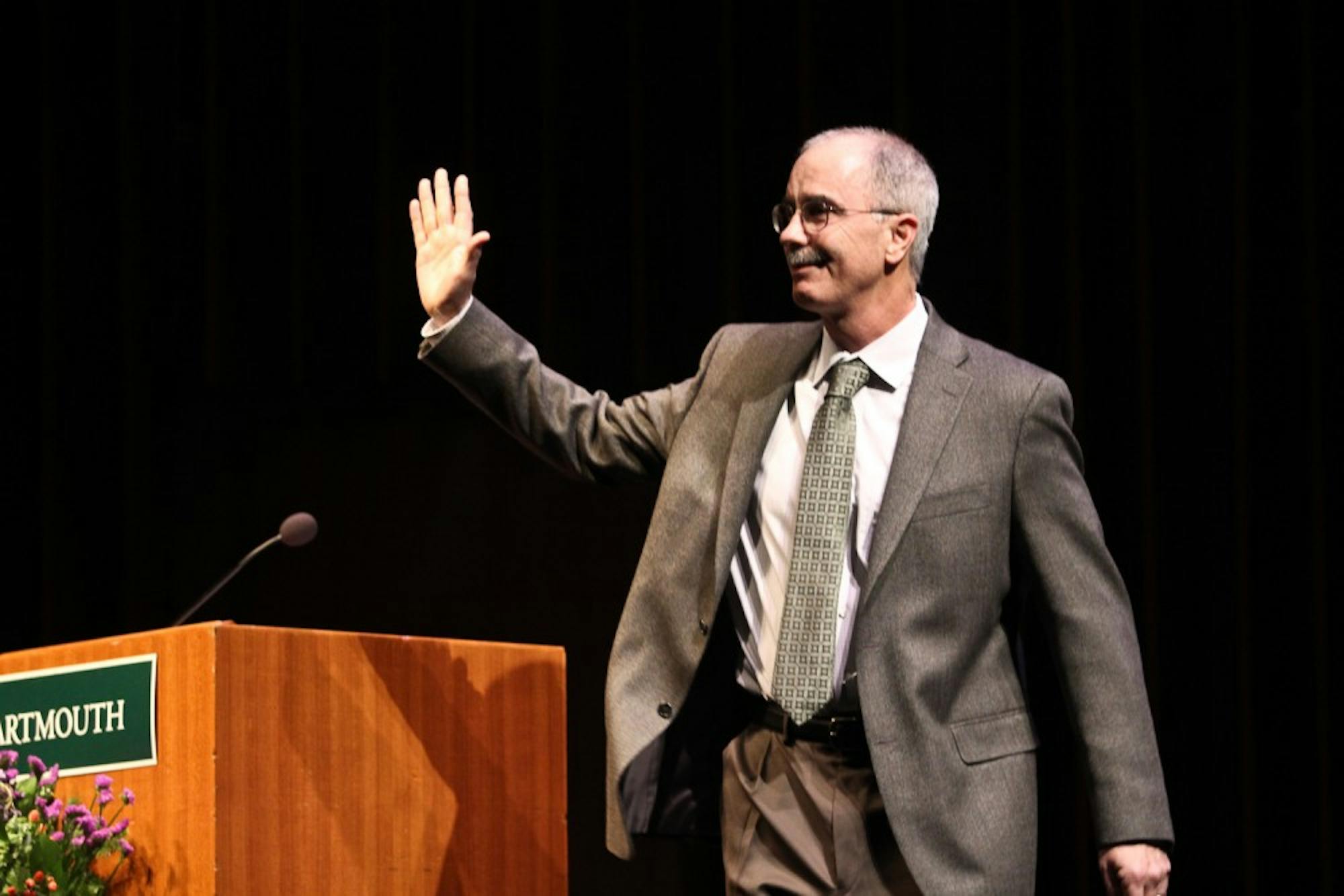College President Phil Hanlon laid out his vision for the future of Dartmouth academics at the general faculty meeting Monday. He stressed the importance of experiential learning and introduced proposals to keep tuition rates flat with inflation, create a freestanding graduate school and hire faculty in clusters.
“We will make a historic investment in the academic enterprise over the next decade,” Hanlon said.
Hanlon said his long-term goals for the College are to remain at the forefront of undergraduate education and increase Dartmouth’s global impact. His first strategy to accomplish these goals is to focus on the importance of experiential learning.
“You develop wisdom, these essential skills, through active, rather than passive learning,” he said.
He asked faculty to consider whether the College should brand its commitment to experiential learning through introducing some sort of institutional program, similar to Princeton University’s requirement that all seniors complete a capstone project and Duke University’s DukeEngage, a summer program where students and faculty collaborate on a service project. Though some might argue the Duke program is “hype,” Hanlon said, such programs have real effects on colleges’ recruiting efforts.
Hanlon also announced his intent to keep the College’s tuition rates flat with inflation. The cost of higher education has increased at a rate of 3 to 5 percent above the rate of inflation for the last 40 years, and Hanlon said the College must find a way to slow this trend.
“That funding model is unsustainable and very near a breaking point,” Hanlon said. “If we don’t get this under control, the next Affordable Care Act is going to be the ‘Affordable Education Act.’”
The College must find new avenues for funding faculty research, such as donations from alumni and faculty investment, because the decreases in both federal funding for research and the decrease in the rate that tuition is increasing would decrease research funding.
As part of his goal to increase Dartmouth’s global impact, Hanlon proposed the creation of a freestanding graduate school, whose dean would report directly to the College Provost instead of to the Dean of the Faculty, as is current practice. This endeavor would mainly involve changes to the existing graduate school structure. Dartmouth’s graduate studies programs are tied to the undergraduate departments, but the College might see changes to this model in the near future.
Dean of Graduate Studies Jon Kull is excited about the possibility, as he said it would simplify the existing graduate program. Restructuring would involve little expansion, and would not hurt the undergraduate departments, he said.
“I don’t think that the two things are mutually exclusive — undergraduate excellence and a graduate school,” he said. “I would like to see a larger role of graduate students interacting with undergraduate students.”
Hanlon spoke of his desire to better connect undergraduates and graduate students.
“My guess is we will hold very firm to the notion that undergraduates are taught by faculty,” he said in an interview. “The direct access to faculty is, I think, above all else what makes the undergraduate experience here so special. If we do it the right way it could be very positive, but I would never want to move away from the ideal we stick to that faculty should be the ones teaching our undergraduates.”
The creation of a graduate school addresses what Hanlon referred to as “fill the middle.” The College should increase its number of postdoctoral students to inject new energy into research and create a more exciting academic climate for its faculty.
One plan to increase these numbers would be significantly expanding the Thayer School of Engineering.
Thayer is already using many of the ideas Hanlon proposed the College focus on, including experiential learning and expanding Dartmouth’s research impact. With only 51 permanent faculty members, the Thayer faculty is currently well below critical mass, Hanlon said.
“I am very excited about it,” Thayer dean Joe Helble said. “Expanding faculty in any way is exciting.”
Hanlon also proposed several ideas he hopes the College will pursue in the coming years. The first, a “4+1” program for the Tuck School of Business, would allow undergraduates to earn a bachelor’s degree and master’s in business administration in five years if adopted. He also advocated “cluster hiring,” in which groups of professors across disciplines interested in similar areas of research would be hired together, as well expanding the Dartmouth Center for the Advancement of Learning to better support faculty in using new education technology and partnering with education technology associations.
These proposals are not yet fully-fledged programs and are merely outlines of goals Hanlon hopes to achieve, College spokesperson Justin Anderson said.
Reallocating College funds and prioritizing its resources is the first step to accomplishing Hanlon’s goals. During his time at the University of Michigan, Hanlon helped the school transition to a self-insurance health plan, saving $235 million a year, and managed the school’s endowment conservatively, distributing 4.25 percent annually in comparison to Dartmouth’s 5.4 percent. Faculty members expressed some concern about the feasibility of Hanlon’s financial plan, the branding of experiential learning and the future of study abroad programs.
Multiple professors requested specific details about how funds would be reallocated and how the tie between tuition increases and inflation would affect the College. They also asked Hanlon about his plans for faculty salaries in the future, which Hanlon said would not be lowered.
Faculty members asked how, specifically, Hanlon would brand experiential learning to the College. They also questioned the future role of study abroad programs at the College.
Hanlon said it is important for students to visit places outside the United States and stressed the importance of courses that allow students to actively learn about subjects that are not usually covered in the traditional abroad programs.




